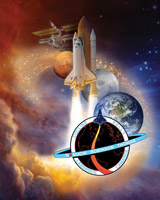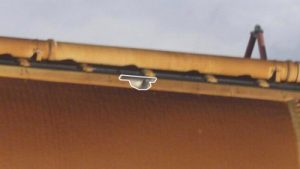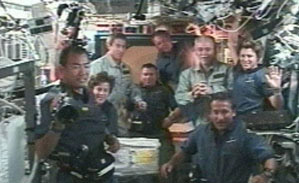 It’s been a very interesting last two days – from the exultation of a successful launch to the deep disappointment upon learning last night that the debris problems with the External Tank (ET) have not been solved. NASA mission managers have determined that a piece of debris seen coming off the External Tank during Discovery’s ascent was insulating foam from an area of the tank known as the Protuberance Air Load (PAL) Ramps. Photos taken by the Discovery crew and by a camera mounted in the underside of the Orbiter showed a missing piece of foam. Below is a photo of the ET, showing area of missing foam:
It’s been a very interesting last two days – from the exultation of a successful launch to the deep disappointment upon learning last night that the debris problems with the External Tank (ET) have not been solved. NASA mission managers have determined that a piece of debris seen coming off the External Tank during Discovery’s ascent was insulating foam from an area of the tank known as the Protuberance Air Load (PAL) Ramps. Photos taken by the Discovery crew and by a camera mounted in the underside of the Orbiter showed a missing piece of foam. Below is a photo of the ET, showing area of missing foam:
The good news is that it does not appear that the foam debris impacted the Orbiter. Whew!!
Troubleshooting and analyses to determine the cause of the foam loss continue. It is a fact that NASA resolves problems after every launch before they launch again. Foam shedding is an issue they will deal with before launching the next mission. The Shuttle program managers are committed to understanding this phenomenon before flying another mission. An important point to keep in mind is that this flight of Discovery and the upcoming flight of Atlantis are test missions. The imagery data and other information gained from these two missions will help make future Shuttle missions safer, and could help in the development of the next-generation spaceship.
Early this morning Discovery successfully docked with the International Space Station (ISS) and Vegas and the rest of the Discovery crew entered the ISS. In the above photo from NASA, Jim Kelly is fourth from left.
More later…
– – – – – – – – – – – – – –
RELEVANT LINKS:
EDITOR’S NOTE: Dr. Michael Freeman is an Associate Professor of aerospace engineering and mechanics at The University of Alabama. He is attending this week’s launch of the space shuttle Discovery, and will publish daily accounts of the events surrounding the shuttle’s “return to flight” launch. UA graduate James Kelly is the pilot of STS-114, NASA’s first space flight in over two years. Dr. Freeman may be reached by e-mail at michael.freeman@ua.edu.

